 | TODAY IN SCIENCE HISTORY
NEWSLETTER - 12 MARCH |
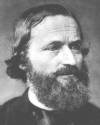 On 12 Mar 1824, Gustav Robert Kirchhoff was born, the German physicist who, with Robert Bunsen, established the theory of spectrum analysis. Readers with a background in physics may also remember his name from the Kirchhoff Laws used to solve problems for currents in multipath circuits. On 12 Mar 1824, Gustav Robert Kirchhoff was born, the German physicist who, with Robert Bunsen, established the theory of spectrum analysis. Readers with a background in physics may also remember his name from the Kirchhoff Laws used to solve problems for currents in multipath circuits.
In an obituary following his death in 1887, one of his students, Robert von Helmholtz wrote A Memoir of Gustav Robert Kirchhoff. In addition to a personal account of Kirchoff's life, lecturing style, discoveries and his contributions in mathematical physics, you can also read Kirchhoff's boast to his banker about getting gold from the sun!
|
 On 12 Mar 1838, William Henry Perkin was born, who was seeking at age 18 to produce artificial quinine (for malaria treatment) when he accidentally instead discovered a beautiful mauve dye. Before 1856, dyeing was a painstaking using colours derived from insects, mollusks, roots or leaves. Perkin launched a new interest in industrial applications of chemical research. Today's Science Store pick is Mauve: How One Man Invented a Color That Changed the World, by Simon Garfield. The author weaves a story which shows how Perkin's discovery, "affected the whole nature of scientific investigation: for the first time, people realized that the study of chemistry could make them rich." Indeed, Perkin became rich and received a knighthood. Available Used from $1.24. (as of time of writing). On 12 Mar 1838, William Henry Perkin was born, who was seeking at age 18 to produce artificial quinine (for malaria treatment) when he accidentally instead discovered a beautiful mauve dye. Before 1856, dyeing was a painstaking using colours derived from insects, mollusks, roots or leaves. Perkin launched a new interest in industrial applications of chemical research. Today's Science Store pick is Mauve: How One Man Invented a Color That Changed the World, by Simon Garfield. The author weaves a story which shows how Perkin's discovery, "affected the whole nature of scientific investigation: for the first time, people realized that the study of chemistry could make them rich." Indeed, Perkin became rich and received a knighthood. Available Used from $1.24. (as of time of writing). Yesterday's pick: The Great Influenza: The Story of the Deadliest Pandemic In History, by John M. Barry.
For picks from earlier newsletters, see the Today in Science Science Store home page. | |
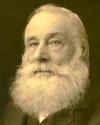
| "Physical chemistry is all very well, but it does not apply to organic substances."
- Sir William Henry Perkin, English chemist and inventor. (born 12 Mar 1838)  |
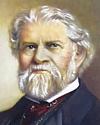 | "If my impressions are correct, our educational planing mill cuts down all the knots of genius, and reduces the best of the men who go through it to much the same standard." - Simon Newcomb, Canadian-American astronomer and and mathematician (born 12 Mar 1835)  |
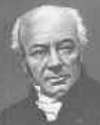
| "No conclusion is more fully established, than the important fact of the total absence of any vestiges of the human species throughout the entire series of geological formations."
- William Buckland, English geologist, palaeontologist and clergyman. (born 12 Mar 1784)  |
| Before you look at today's web page, see if you can answer some of these questions about the events that happened on this day. Some of the names are very familiar. Others will likely stump you. Tickle your curiosity with these questions, then check your answers on today's web page. |
 |  Sir William Henry Perkin, born 12 Mar 1838, was an English chemist and inventor. In his youth, he was enthused about chemistry by attending public lectures by Faraday. While experimenting to synthesize quinine, Perkin mixed aniline and sodium dichromate and unexpectedly found he had discovered the first artificial dye that he named aniline purple. By age 23, he was fathering a new synthetic organic chemical industry. Sir William Henry Perkin, born 12 Mar 1838, was an English chemist and inventor. In his youth, he was enthused about chemistry by attending public lectures by Faraday. While experimenting to synthesize quinine, Perkin mixed aniline and sodium dichromate and unexpectedly found he had discovered the first artificial dye that he named aniline purple. By age 23, he was fathering a new synthetic organic chemical industry.  What was the substance Perkin was investigating, from which he derived his famous mauve dye? What was the substance Perkin was investigating, from which he derived his famous mauve dye?  |
 |  Sir William Henry Bragg (1862-1942) was an English pioneer scientist in solid-state physics who was a joint winner (with his son Sir Lawrence Bragg) of the Nobel Prize for Physics in 1915 for his work. Sir William Henry Bragg (1862-1942) was an English pioneer scientist in solid-state physics who was a joint winner (with his son Sir Lawrence Bragg) of the Nobel Prize for Physics in 1915 for his work.
 What did Bragg determine that led to the Nobel Prize award? What did Bragg determine that led to the Nobel Prize award? |
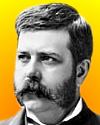 |  An American engineer and inventor and industrialist (1846-1914) was chiefly responsible for the adoption of alternating current for electric power transmission in the United States. The company he established remains well-known and still carries his name. An American engineer and inventor and industrialist (1846-1914) was chiefly responsible for the adoption of alternating current for electric power transmission in the United States. The company he established remains well-known and still carries his name.
 Can you name this inventor? Can you name this inventor? |
|  On 12 Mar 1894, the first bottles of a new beverage were sold in the U.S. On 12 Mar 1894, the first bottles of a new beverage were sold in the U.S.  Can you name this beverage? Can you name this beverage? |
|  On 12 Mar 1755, a steam engine was first reported used in America. It was imported from England by Josiah Hornblower and put to use pumping water from the mine of Colonel John Schuyler in New Barbados Neck (now North Arlington), NJ. On 12 Mar 1755, a steam engine was first reported used in America. It was imported from England by Josiah Hornblower and put to use pumping water from the mine of Colonel John Schuyler in New Barbados Neck (now North Arlington), NJ.  What product was being mined by Col. Schuyler? What product was being mined by Col. Schuyler? |
When you have your answers ready to all the questions above, you'll find all the information to check them, and more, on the March 12 web page of Today in Science History. Or, try this link first for just the brief answers.
Fast answers for the previous newsletter for March 11: Vulcan; the decade including the year 1935; penicillin; the decade include the year 1811; Spanish Flu.
|
 If you enjoy this newsletter, the website, or wish to offer encouragement or ideas, please send feedback by using your mail reader Reply button. If you enjoy this newsletter, the website, or wish to offer encouragement or ideas, please send feedback by using your mail reader Reply button. |
--
If you do not want to receive any more newsletters,
Unsubscribe To update your preferences and to unsubscribe visit
this link 


 On 12 Mar 1824, Gustav Robert Kirchhoff was born, the German physicist who, with Robert Bunsen, established the theory of spectrum analysis. Readers with a background in physics may also remember his name from the Kirchhoff Laws used to solve problems for currents in multipath circuits.
On 12 Mar 1824, Gustav Robert Kirchhoff was born, the German physicist who, with Robert Bunsen, established the theory of spectrum analysis. Readers with a background in physics may also remember his name from the Kirchhoff Laws used to solve problems for currents in multipath circuits. 



 Sir William Henry Perkin, born 12 Mar 1838, was an English chemist and inventor. In his youth, he was enthused about chemistry by attending public lectures by Faraday. While experimenting to synthesize quinine, Perkin mixed aniline and sodium dichromate and unexpectedly found he had discovered the first artificial dye that he named aniline purple. By age 23, he was fathering a new synthetic organic chemical industry.
Sir William Henry Perkin, born 12 Mar 1838, was an English chemist and inventor. In his youth, he was enthused about chemistry by attending public lectures by Faraday. While experimenting to synthesize quinine, Perkin mixed aniline and sodium dichromate and unexpectedly found he had discovered the first artificial dye that he named aniline purple. By age 23, he was fathering a new synthetic organic chemical industry. 
 Sir William Henry Bragg (1862-1942) was an English pioneer scientist in solid-state physics who was a joint winner (with his son Sir Lawrence Bragg) of the Nobel Prize for Physics in 1915 for his work.
Sir William Henry Bragg (1862-1942) was an English pioneer scientist in solid-state physics who was a joint winner (with his son Sir Lawrence Bragg) of the Nobel Prize for Physics in 1915 for his work. What did Bragg determine that led to the Nobel Prize award?
What did Bragg determine that led to the Nobel Prize award? 
 An American engineer and inventor and industrialist (1846-1914) was chiefly responsible for the adoption of alternating current for electric power transmission in the United States. The company he established remains well-known and still carries his name.
An American engineer and inventor and industrialist (1846-1914) was chiefly responsible for the adoption of alternating current for electric power transmission in the United States. The company he established remains well-known and still carries his name. Can you name this inventor?
Can you name this inventor?  On 12 Mar 1894, the first bottles of a new beverage were sold in the U.S.
On 12 Mar 1894, the first bottles of a new beverage were sold in the U.S.  Can you name this beverage?
Can you name this beverage?  On 12 Mar 1755, a steam engine was first reported used in America. It was imported from England by Josiah Hornblower and put to use pumping water from the mine of Colonel John Schuyler in New Barbados Neck (now North Arlington), NJ.
On 12 Mar 1755, a steam engine was first reported used in America. It was imported from England by Josiah Hornblower and put to use pumping water from the mine of Colonel John Schuyler in New Barbados Neck (now North Arlington), NJ.  What product was being mined by Col. Schuyler?
What product was being mined by Col. Schuyler?  If you enjoy this newsletter, the website, or wish to offer encouragement or ideas, please send feedback by using your mail reader Reply button.
If you enjoy this newsletter, the website, or wish to offer encouragement or ideas, please send feedback by using your mail reader Reply button. 

Δεν υπάρχουν σχόλια:
Δημοσίευση σχολίου